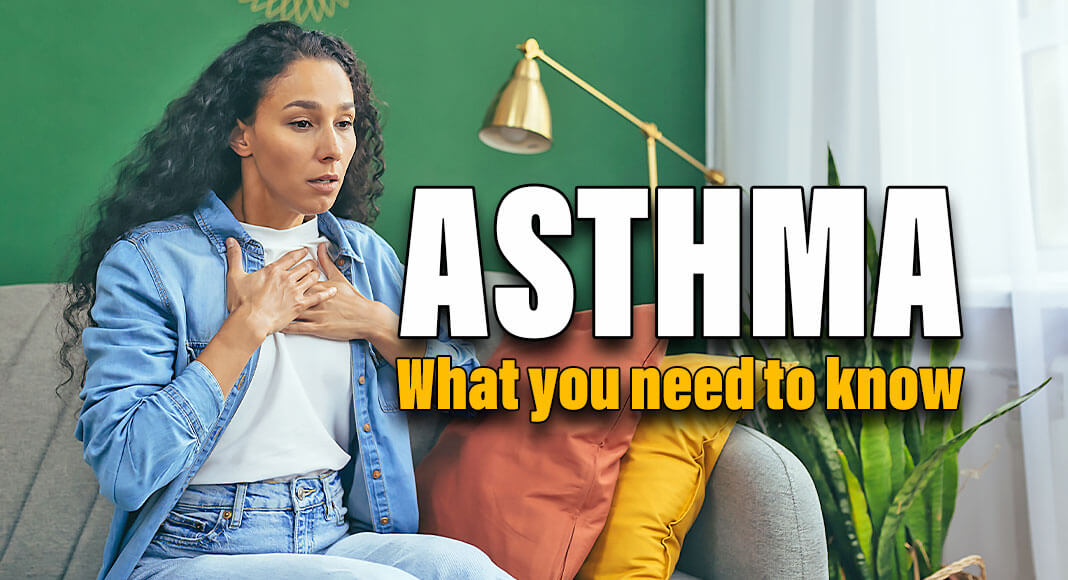
Mega Doctor News
Asthma is a disease that affects your lungs. It is one of the most common long-term diseases of children, but adults can have asthma, too. Asthma causes wheezing, breathlessness, chest tightness, and coughing at night or early in the morning. If you have asthma, you have it all the time, but you will have asthma attacks only when something bothers your lungs.
We don’t know all the things that can cause asthma, but we do know that genetic, environmental, and occupational factors have been linked to developing asthma.
If someone in your immediate family has asthma, you are more likely to have it. “Atopy,” the genetic tendency to develop an allergic disease, can play a big part in developing allergic asthma. However, not all asthma is allergic asthma.
Being exposed to things in the environment, like mold or dampness, some allergens such as dust mites, and secondhand tobacco smoke have been linked to developing asthma. Air pollution and viral lung infection may also lead to asthma.
Occupational asthma occurs when someone who never had asthma develops it because he or she is exposed to something at work. This can happen if you develop an allergy to something at work such as mold or if you are exposed to irritants such as wood dust or chemicals at work over and over at lower levels or all at once at higher levels.
How Can You Tell if You Have Asthma?
It can be hard to tell if someone has asthma, especially in children under age 5. Having a doctor check how well your lungs work and check for allergies can help you find out if you have asthma.
During a checkup, a doctor will ask if you cough a lot, especially at night. He or she will also ask whether your breathing problems are worse after physical activity or at certain times of year. The doctor will then ask about chest tightness, wheezing, and colds lasting more than 10 days. He or she will ask whether anyone in your family has or has had asthma, allergies, or other breathing problems. Finally, the doctor will ask questions about your home and whether you have missed school or work or have trouble doing certain things.
The doctor may also do a breathing test, called spirometry, to find out how well your lungs are working by testing how much air you can breathe out after taking a very deep breath before and after you use asthma medicine.
What Is an Asthma Attack?
An asthma attack may include coughing, chest tightness, wheezing, and trouble breathing. The attack happens in your body’s airways, which are the paths that carry air to your lungs. As the air moves through your lungs, the airways become smaller, like the branches of a tree are smaller than the tree trunk. During an asthma attack, the sides of the airways in your lungs swell and the airways shrink. Less air gets in and out of your lungs, and mucous that your body makes clogs up the airways.
You can control your asthma by knowing the warning signs of an asthma attack, staying away from things that cause an attack, and following your doctor’s advice. When you control your asthma:
- you won’t have symptoms such as wheezing or coughing,
- you’ll sleep better,
- you won’t miss work or school,
- you can take part in all physical activities, and
- you won’t have to go to the hospital.
What Causes an Asthma Attack?
An asthma attack can happen when you are exposed to “asthma triggers.” Your asthma triggers can be very different from someone else’s asthma triggers. Know your triggers and learn how to avoid them. Watch out for an attack when you can’t avoid your triggers. Some of the most common triggers are tobacco smoke, dust mites, outdoor air pollution, cockroach allergen, pets, mold, smoke from burning wood or grass, and infections like flu.
How Is Asthma Treated?
Take your medicine exactly as your doctor tells you and stay away from things that can trigger an attack to control your asthma.
Everyone with asthma does not take the same medicine.
You can breathe in some medicines and take other medicines as a pill. Asthma medicines come in two types—quick-relief and long-term control. Quick-relief medicines control the symptoms of an asthma attack. If you need to use your quick-relief medicines more and more, visit your doctor to see if you need a different medicine. Long-term control medicines help you have fewer and milder attacks, but they don’t help you while you are having an asthma attack.
Asthma medicines can have side effects, but most side effects are mild and soon go away. Ask your doctor about the side effects of your medicines.
Remember – you can control your asthma. With your doctor’s help, make your own asthma action plan. Decide who should have a copy of your plan and where he or she should keep it. Take your long-term control medicine even when you don’t have symptoms.
Learn How to Use Your Asthma Inhaler.
Information Source: CDC
See Related Story:










